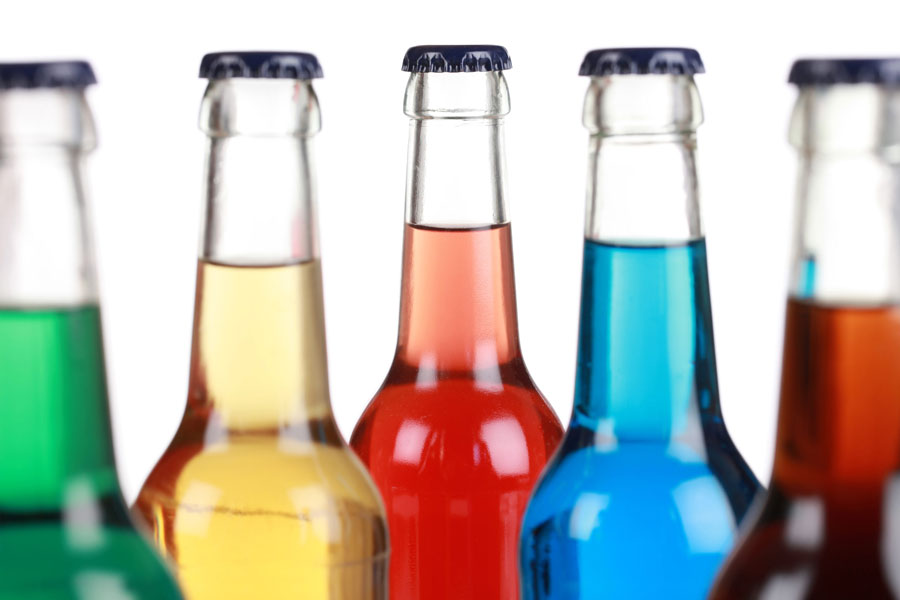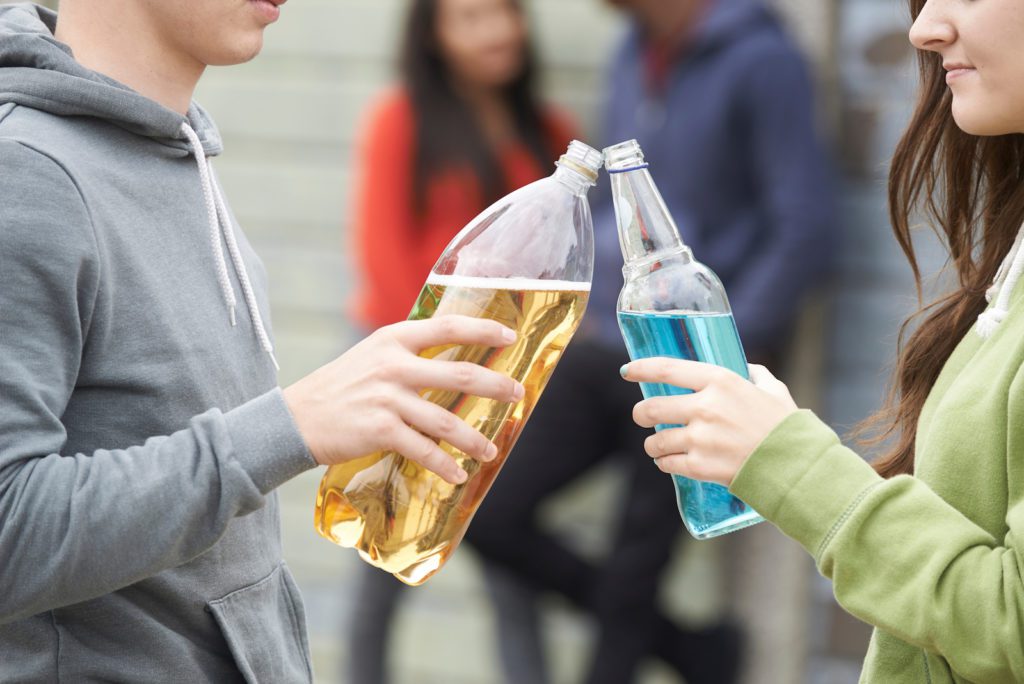
Table of Contents
Alcopops are a type of alcoholic drink full of soda-like flavor, which led to the nickname “alcopops” because they have a sweet taste and an alcohol content. However, alcopops are not a brand of alcohol but rather a genre. Alcopops are generally any alcoholic drink that is sugary, similar to soda-pop and has a fairly low alcohol content compared to other drinks like hard alcohol.
Alcopops typically have an alcohol content of 3% to 7% and often come with fruit or malt flavors, bright colors, and lots of sugar. They are attractive to young people because they do not taste like alcohol and are marketed as tasty, fun, and youthful. As a result, many teenagers are drawn to drinking these beverages.
When young people and teenagers begin drinking underage, and illegally, there is a higher risk for them to develop an alcohol addiction which can have an extreme ripple effect throughout their young and impressionable lives.
Alcopops may not seem like a particularly threatening beverage, but they are appealing to teens. Teens who drink alcohol typically do not understand alcohol, the effects of intoxication, and the effect drinking at a young age can have on their brains as they develop.
It is important to know about alcopops and how attractive they are to younger teens so that parents and caregivers can help to prevent their children from getting hurt or getting addicted to alcohol at a young age.
Alcohol addiction at a young age can impact various aspects of a teenager’s life, including their education, social life, mental health, physical health, neurological development, and internal organ health, particularly the liver.
What Are Alcopops?
The first step is to understand what alcopops are. As stated earlier, alcopops are any type of fruity, soda-pop-ish, sweet alcoholic beverage that is generally low in alcohol but high in sugar. These drinks are appealing to young teens because they do not have the taste associated with alcohol.
They are also typically fairly cheap when compared to other types of alcohol, so teens find them accessible and easy to afford.
The marketing of alcopops is one of fun in the sun, youthfulness, and refreshment. However, these drinks are not marketed in a way appealing to adults or older folks. Instead, they are marketed toward the younger crowd. Everything about alcopops screams “young,” which is another reason teens are drawn to alcopops.
Wine coolers are very similar to alcopops, although, with wine coolers, you know that the alcohol in the drink is wine. When it comes to alcopops, you never really know what kind of alcohol is in the drink unless it says it on the label. However, many alcopops do not say what type of alcohol they are because they are marketed toward younger crowds that do not care what kind of alcohol is in the drink. They just want the drink.
Alcopops are easy to drink because they do not taste like alcohol. You can quickly and easily drink several alcopops without realizing it, thus getting very intoxicated quickly. This is very common in teens who are underage drinking because they do not realize how alcohol affects their bodies yet. They can quickly drink several alcopops because of their sweet flavor and get very drunk. This is the appeal of alcopops and the trouble with them. Additionally, alcopops look like soda-pop bottles, making it hard for parents to spot them.
What Are the Risks & Side Effects of Drinking Alcopops?
The biggest risk of alcopops is getting too drunk too fast. Young people do not have the knowledge or experience to know when enough is enough to drink alcohol. In addition, the flavors make them easy to drink quickly, so a young person can drink a copious amount of alcohol before it is metabolized.
Once the alcohol is metabolized, the intoxication hits all at once, and the young person has a high blood alcohol content (BAC) and is showing clear signs of intoxication. This is dangerous because young teens do not know how to handle alcohol. As a result, they may continue to drink once they are already highly intoxicated and need to go to the hospital.
Blackouts or memory loss can occur when you drink too much too quickly. For young teens, blackouts can be a sign of damage occurring to the brain’s memory center. This is a sign of a dangerous effect on the neurological development of the brain of a teenager. The brain can also easily and quickly become dependent on alcohol because it is still developing.
Another dangerous side effect of drinking alcohol underage is the impairment of executive function. Drinking underage can make teens do impulsive or dangerous activities while intoxicated, which can lead them to hurt themselves or others.
The prefrontal cortex of the brain is the last part of the brain to finish developing around 25 to 28 years old. The prefrontal cortex is where our decision-making skills are held, our rational thoughts, and our ability to be cognitively mature about our choices. Teenagers can be impulsive and prone to risk-taking because this cortex is not yet fully developed.
When you add alcohol like alcopops into the equation, you have a teen prone to risk-taking, impulsivity, and reward-seeking behavior with loosened inhibitions. This is where mistakes can be made, and teens can hurt themselves or others with their actions.
Why Are Alcopops a Danger to Youth? Why You Need to Be on the Lookout for Youth Drinking Alcopops
All the reasons written above are reason enough to prove that alcopops (and any type of alcohol) are a danger to youth. However, when it comes to alcopops, one thing sets them apart.
You may have heard of the term “gateway drugs” used to describe softer types of drugs that can lead users to seek out harder drugs with more dangers and more extreme highs. That is very similar to alcopops. Alcopops are an easy way to introduce alcohol and drinking, leading some youths to hard alcohol and beverages with higher alcohol content.
This can lead to an alcohol addiction at a very young age. Of course, not every teen who drinks underage will become an alcoholic or move to harder drinks. Still, to decrease the number of teens addicted to alcohol, all parents and caregivers should look for alcopops.
Talking to your teen about alcohol and inviting them to ask questions and learn about the dangers in a safe and supportive environment can help them avoid the mess of youth alcoholism.
Treating Alcohol Addiction in the Early Stages: Why You Should Seek Help at the Onset of Drinking Alcopops in Your Youth
If you find yourself or your teenager drinking alcopops frequently to the point of getting extremely intoxicated, you may want to consider getting professional help. A good method of seeing if you are suffering from alcohol addiction is to try to go for several days without alcohol and monitor your mental and physical state during those days.
If you find yourself craving alcohol, thinking about drinking non-stop, feeling shaky, dizzy, fatigued, or suffering from withdrawal symptoms, you may have an alcohol problem.
The symptoms of alcoholism include:
- Tremors in the hands, legs, and fingers
- Anxiety
- Depression
- Sweats
- Vomiting
- Feeling restless
- Feeling fatigued
- Intense alcohol cravings
- Sleeplessness
All of these are signs of a larger problem with alcohol. If you or your teenager is experiencing these symptoms of alcoholism and withdrawal, it may be time to have a serious discussion about what is going on.
For teenagers suffering from alcoholism, you need a trusted adult support system to help you work through what is happening. You may get in trouble for underage drinking, but you can overcome it if you suffer from addiction. Talk to your doctor, parents, a trusted relative, teacher, or a friend’s parent who can help you figure out how to navigate this intense situation.
If you suspect your teenager has an alcohol problem, do not attack them or accuse them of anything. You will only make your teen feel defensive and attacked. Instead, sit down with them and calmly and kindly explain what you are afraid is going on. Treat your teenager as an adult. Give them respect and time to talk about their feelings about the issue. If you make sure your teen feels like they are in a safe space to seek help without getting yelled at or punished, they will likely open up and rely on you to guide them toward help.
Whether you or your teen suffers from alcoholism, you deserve treatment and healthy life free from the vice of addiction. Please reach out to our premier rehab facility to help get onto the best path for your situation.
Sources:
Ocean Recovery has strict sourcing guidelines and relies on peer-reviewed studies, academic research institutions, and medical associations for our references. We avoid using tertiary references as our sources. You can learn more about how we source our references by reading our editorial policy.
1. National Research Council (US) and Institute of Medicine (US) Committee on Developing a Strategy to Reduce and Prevent Underage Drinking; Bonnie RJ, O’Connell ME, editors. Reducing Underage Drinking: A Collective Responsibility. Washington (DC): National Academies Press (US); 2004. 3, Consequences of Underage Drinking. https://www.ncbi.nlm.nih.gov/books/NBK37591/
OCEAN RECOVERY EDITORIAL GUIDELINES
The internet contains a vast amount of misinformation, but when it comes to your health only peer reviewed, research centered data matters. At Ocean Recovery, all content published throughout our website has been rigorously medically reviewed by a doctorate level clinician, and cross checked for medical accuracy. Our editorial process helps our readers trust that the information they are consuming is factual and based upon scientific data. Your health is our top priority, find out more about how we safeguard the integrity of information on our website. Read More About Our Process






